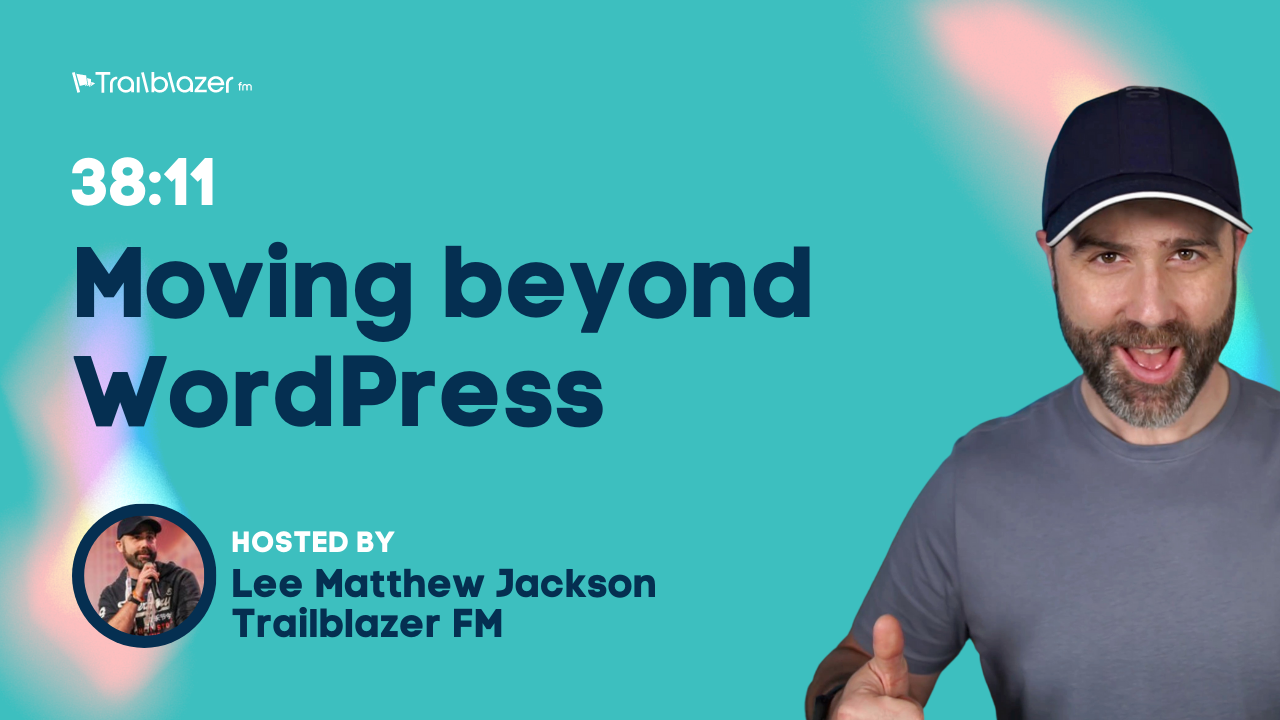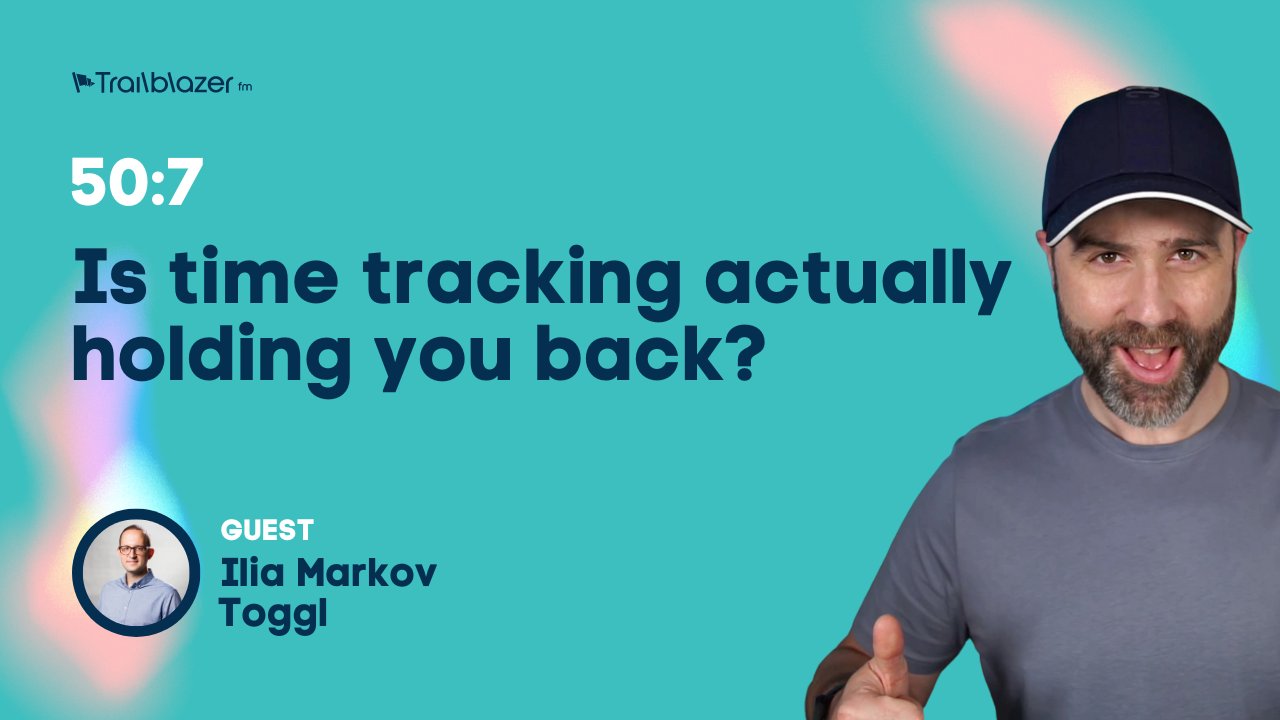
38:11 Why we are moving beyond WordPress
UPDATE: Well, I was wrong. Episode coming up as to why 😉
After years implementing awesome WordPress solutions we are breaking up. It’s not just us… it’s WordPress too! We will stay friends, we love the community and will continue to work with it where it meets relevant needs. But since we started dating, we feel WordPress has changed and not for the better.

In this episode I share our challenges with WordPress and the direction we are headed as we slowly diversify.
I discuss:
- Pace of development
- Database structure
- Plugin ecosystem
- Growing implementer community
- Target user base
- WordPress leadership structure
- The direction we are heading
Transcript
Welcome to the Agency Trailblazer Podcast, this is your host Lee and on today’s show I’m going to air my dirty laundry as I share WHY we are breaking up with WordPress.
Before we jump in, I’d like to thank our sponsor Cloudways who offer awesome Managed Cloud Hosting via leading cloud providers. We trust their easy to use interface for all our major agency projects. Speed, support and service are all essential to our growing business and Cloudways has us covered. You can find out more over on trailblazer.fm/cloudways).
For those of you who don’t know my main business is an agency called Event Engine. Boast alert: We’ve worked in various forms over the last 10 years using WordPress as our framework to deliver event websites where we’ve powered thousands of events and have had an amazing journey. Our model as been a combination “website as a service” and custom builds. Our event software has developed significantly over the years and we’ve integrated with many other third party solutions giving us a strong position in the industry.
Being an event owner myself in 2020 and realising I would need to bring my own event online, I was in a unique position to utilise our existing tech to put on Agency Transformation Live 2020. This lead to multiple new opportunities within our sector to support other event organisers with bringing their events online and we found ourselves with a brand new product stream.
Not only were we helping event organisers attract sponsors and visitors to their events, but we were now helping them put on their events digitally touching all aspects of event production. This was a huge learning curve for us, one that we had to staff up for and as of March 2021 we’ve had the pleasure of supporting many event organisations transition from physical to digital.
WordPress has been the backbone of all we do which has both lead to our success, and held us back.
- Whenever we face a problem, we assume WordPress will be the answer. Sometime it isn’t.
- When building new products, we lean on WordPress enjoying it’s benefits and fighting its drawbacks.
- We’ve relied so much on the WordPress ecosystem our own skill sets have stagnated.
- And finally our reliance on WordPress, regular updates and third party plugins has created an ongoing larger support burden.
Our reliance has become both the recipe for our success and the blocker to scalability. In this episode, I’d like to share our case for moving beyond WordPress and what directions we are considering.
Before we jump in, if you do have issues with resource and scaling right now, I’d like to give Brad and the team at GoWP a massive shout-out who’ve scaled their business to support you with WordPress maintenance and development. So if you’re looking to scale and need extra support, be sure to go to GoWP.com and tell them Lee Matthew Jackson sent you!
Let’s take a look at our key challenges.
Pace of development
Over the years WordPress has added many amazing features that have transformed how we build websites and deliver services. Custom Post Types in version 3.0 were a game changer. Multisite being merged into core allowed us to deliver better experiences. The REST API has been invaluable for third party integration. Yet over 10 years these are still the only innovations we rely on.
WordPress is an aging product that moves very slowly. It continues to do what it did very well, but does not appear to be breaking any new ground for us as developers. Implementers and users have become the main focus in my opinion. The way we build, support and maintain WordPress sites has changed very little over the years meaning we benefit from the same features but continue to battle the same drawbacks.
One of those drawbacks being the database design which has not improved in years.
Database structure
Custom fields and post types have allowed us to create rich database applications however the design of the post_meta table has long been a drawback. If I create a post type and relate 5 fields to it, I have a Post record plus 5 separate post_meta records. That’s 6 records for one piece of data. As your systems grow with your clients, and the amount of data they wish to manage increases, you can imagine how large a database can get, and how long data manipulation can begin to take.
Whilst using WordPress functions to query the data can be extremely efficient, over time as the data needs pile up, we find performance deteriorates over time. We are left either archiving data (which is probably a good practice) or massively upping server specs to cope with increased demand. We see clients who do store a large amount of data tend to migrate away from WordPress eventually.
Being in the events industry, and with online events here to stay, data requirements are only going to increase.
The plugin ecosystem
Our performance and that of WordPress is also affected by the plugin ecosystem that has built up around it. It’s become all too easy to say “well, there’s a plugin for that” which leads to very disjointed development and user experiences. Sites that rely on multiple plugins, in our experience, tend to suffer with performance issues. Ticket numbers submitted for sites relying on them far outweigh any other ticket type on our platform.
Whilst the plugin ecosystem allows us as an agency to be responsive, and lower our cost of entry, it’s made us lazy as developers and creates an ongoing support burden. Using plugins may be quick and cost effective at the time, yet regular updates, eventual bugs and the changing needs of our clients build up over time.
Whilst clients can pay for ongoing support, there are other costs beyond time. Team members don’t enjoy bug fixing, updating and testing sites, or dealing with usage issues. This is not good for team morale and it takes up the time of our valuable talent. We only wish to build scalable sites that meet client needs now, allow scalability in the future and promote a positive long term relationship.
I feel WordPress sites are slowly devaluing as they could be considered “disposable”. No-code quick website creation has produced a generation of implementers.
Implementer community
I am horrified as I watch YouTubers tell people with limited technical experience that they can run their own agency. Whilst these YouTubers get rich off affiliates and launching their own plugins to cash in, there are countless “WordPress Implementers” struggling to deliver sites to trusting clients. These same implementers end up relying on bloated premium plugins to deliver client requirements which this leads to many horrific sites and catastrophic client relationship breakdowns.
Sure, there are many out there running great businesses using WordPress and some selected addons in a controlled manner with the backing of contractors. I applaud these agencies who are using the tools to deliver value responsibly, however as I watch the community evolve, I see more and more people asking for help in areas that any responsible agency owner should have the answer for.
Premium plugin developers have seized on this influx of WordPress implementers and instead of a rich tapestry of well developed plugins that are developer and user friendly, we’re being flooded with bloated plugins and blatant attempts to draw people into ecosystems. A growing community of sometimes entitled WordPress implementers are then flooding community spaces adding to the noise and to the distraction.
I know I will sound like a developer snob to some right now, but if you take the time to listen to or read this podcast, then I am unlikely talking about you as you clearly care about learning. A reason I’ve removed myself from most social platforms has been in part due to the sub community leaning on other agency owners expecting free help and support, and seeing the vultures circling for cash grabs. Wow, I do sound like a cynical old man… But then I am 40 next year!
Disclaimer: The WordPress community is still full of awesomeness and there are wonderful groups with a good balance of skillsets and business types. A great example would be the GoWP Community of which if you haven’t checked it out I highly recommend and I try to visit a couple of times a week for a happiness boost!
Target user base
From the growing implementer community comes a perceived shift in the target user base for WordPress. 10 or so years ago we felt like a niche group of developers creating awesome projects for our clients using WordPress as a development framework. WordPress today seems to be focusing most of it’s muscle and direction on the growing “do it yourself” user base.
Gutenberg, for example, is an exciting shift for the end user and the implementer alike, but as a development team it’s evolving nature has been a nightmare. Whilst the Classic Editor plugin is our friend for now, we know things will need to change and we will have to incorporate it into our client’s workflows.
My concern is the continued dumbing down of WordPress to make it more attractive to the masses at the expense of it’s power and speed. Rather than WordPress becoming the lean framework that Matt suggested in a “State of the word” many moons ago, we are witnessing the birth of a “Wix or Squarespace killer”.
As a team of developers, we have a growing need to control user experiences and develop beyond the decisions of the few at the top. This segway’s perfectly into our last concern.
WordPress leadership structure
We are aware that behind WordPress is a business and we are grateful to all the work that’s been done over the years. It is a concern, however that WordPress is led by one business that calls all the shots and equally benefits from the directions that it chooses for the roadmap. I no longer see a community driven open source project. I see a centralised, controlled and managed platform that I have little to no influence over any more as a developer, user or supporter.
What goes into core feels completely outside of our control or influence, and whilst we feel those at the top have their own agendas and target audience, we’ve come to the conclusion that WordPress may not serve our own target audience forever.
The direction we are heading
What all this said and done, we will still use WordPress for the foreseeable future in all the use cases that we see it working, where we can also provide the most value to our clients. However as an agency we are shifting our development strategy.
We recognise that WordPress has changed and we as an agency have too. Change isn’t a bad thing either! Change forces us to re-evaluate what we are doing, review our business models and to evolve.
Over the next few years we will be adopting an MVC development model. Our team are upskilling their language portfolios and we are exploring exciting new frameworks. Frameworks that would give us the flexibility to develop what is needed efficiently, the ability scale infinitely and control for stability. (I am aware that rhymes, LOL).
Rather than relying on WordPress as a framework, and riding the wave of the ever changing ecosystem, we will be creating and managing our own. Sites will likely be more time intensive to build and more costly, but the longevity of our work should be dramatically increased. We’ve come to realise that taking the “easy route” to website development does create the many issues I’ve shared in this thought piece.
So this isn’t goodbye forever WordPress, but it’s hello to a new way of doing agency life. A new way of developing websites. A new way of supporting our enterprise clients. A new path as we build new applications for a changing world.
What do you think?
Head on over to the comments on this episode via trailblazer.fm and share your thoughts with us. What do you agree with? What do you disagree with? Are you making changes in your agency? Are you doubling down on WordPress and banking on it for your future? I’d love to have a conversation with you all.
And of course, if we don’t see you in the comments, then let’s see you in next weeks episode.








